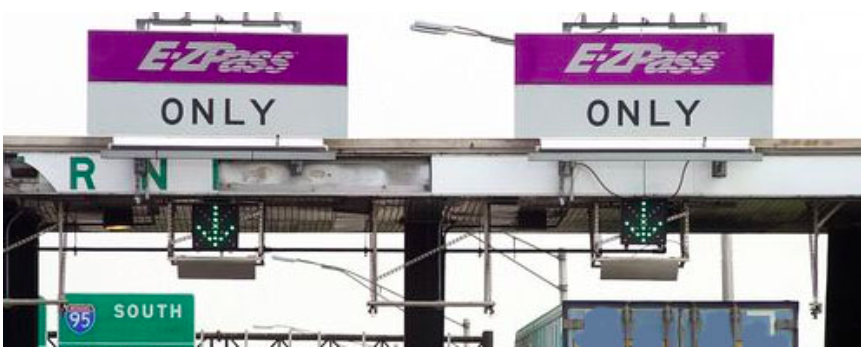Professor of Finance for the College of Staten Island and Research Fellow at The University Transportation Research Center Johnathan Peters says if Connecticut lawmakers are looking to raise revenue for transportation, they might be better off looking somewhere else besides highway tolls.

“Tolls, generally, are expensive to collect,” Peters said in an interview. “It’s not free. There’s a lot of technology and a lot of equipment, and that equipment will have to be maintained and replaced over time.”
Peters — whose area of expertise and study involves regional planning and road and mass transit financing — says tolls are more expensive to collect than the gasoline tax and is a regressive form of taxation that affects lower income individuals.
“This is a regressive form of taxation. This can be very, very painful for a low-income household,” Peters said. “It could be the straw that breaks the camel’s back for the working poor.”
Although 2019’s tolls debate has just begun, it started out with a bang as the newly-elected Democratic senator from Greenwich, Alexandra Bergstein, filed the first bill authorizing the Connecticut Department of Transportation to install tolls on Connecticut’s highways. Bergstein is also chairwoman of Connecticut’s Transportation Committee.
The latest study from the CT DOT posited 82 tolls on nearly every Connecticut highway, combined with a pricing system offering discounts for in-state commuters.
The DOT study estimates the state could take in nearly $1 billion per year in toll revenue, after accounting for $100 million per year in operating costs, or about 10 percent of gross revenue.
Peters says this number “seems a bit low,” and that operating costs typically approach closer to 20 percent.
The state study also estimates $372 million in start-up costs, which range from installing fiber optic lines, to the cost of equipment, gantry construction and a “toll collection system.”
Peters says the start-up and operating costs make tolls an “inefficient” taxation method. “You’re going to have millions of transactions and then you have the costs of enforcement.”
The CT DOT study posited an electronic tolling system in which commuters with an E-Z Pass would have funds automatically deducted from their accounts, but those without an electronic pass would have their license plates photographed and be mailed a bill. This raises the issue of enforcing compliance.
“Not everyone will pay,” Peters said, “but in order to make the system work, you have catch some of them.”
Other states have wrestled with toll non-compliance. Massachusetts for instance, loses between $15 and $16 million per year in tolls from drivers who have not paid to use the Massachusetts Turnpike. The loss is known as “leakage,” and forces the state to make efforts to collect.
Failure to pay the toll bill received by mail can come with a hefty fine for the driver. New York levies a fine up to $100 for not paying a toll bill on time – a fine replicated in a 2018 Connecticut tolling bill.
Failure to pay tolls and fines over a certain amount can result in vehicle registration suspension in New York.
Toll proponents maintain that tolling the highways is the best way to generate the revenue the state needs to maintain and expand it infrastructure to make the state more attractive to businesses and families.
Bergstein said in a series of town hall style public meetings that tolls would lessen highway congestion and allow Connecticut to invest more in public transportation, particularly the Metro-North line which runs from New Haven through Fairfield County and into New York City.
However, Connecticut’s public transportation costs are already covered by Connecticut drivers. The vast majority of transportation funding comes from the gasoline tax, the oil companies tax and motor vehicle registration and fees – all of which are born by car owners.
Part of those funds are used to subsidize trains and buses to make up for costs not covered by ticket sales. In 2018, Connecticut spent $376 million on buses and trains, according to state comptroller’s Open Checkbook website.
Connecticut’s spending on public transportation has risen faster than any other transportation cost besides fringe benefits for DOT employees.
Peters says the toll debate might be missing a major component: namely, what specific projects the toll revenue would be used for.
To date, the debate over tolls has largely hinged on the conditions of Connecticut’s roads and bridges, the Special Transportation Fund’s budget and the suspension of 400 infrastructure projects by Gov. Dannel Malloy in 2018.
For now, anyway, the STF is projected to finish out the next few years with a surplus and revenue to the transportation fund is projected to grow by $310 million by 2022.
Whether that will be enough to meet some lawmakers’ demands for transportation and infrastructure spending remains to be seen and the tolling debate remains far from over as protesters start to push back against the biggest and most hotly-contested item so far in the Democrats’ top five legislative agenda items.
“You want people to go to work, but how much do you want to make them pay?” Peters says. “If they [lawmakers] just want the money, there’s lots of ways to raise the money by relying on the existing tax system. The question is: how do you do it in a way that is fair and just?”


Lincoln10023
January 29, 2019 @ 3:58 pm
I spent 25 years in the toll business in NY and for 20 of those years was involved in operating the E-ZPass program for my agency. I want to provide some actual practical experience to this discussion, since it appears that those quoted or who have provided information do so from mostly an academic perspective.
Sure, toll collection costs money but so does collecting the gas tax and for that matter so does operating all the highways and roads in CT. For example, I95 is not currently free by any means. Road maintenance and operation is paid from a series of taxes and fees collected mostly from CT residents. By the way, some of the taxes and fees collected to currently maintain CT roads are regressive too. Last time I looked, for example, the gas tax was one rate for all incomes and not scaled to income. How is this different than a toll Professor Peters?
I am not familiar with all the numbers being mentioned in the article about the cost of operation for an E-ZPass system in CT but I would say that without a doubt, CT has a BIG advantage at this point in 2019 since it is completely surrounded by neighboring states who have very mature E-ZPass systems and many millions of customers that have tags for their cars and trucks. This should significantly lower the cost to CT of opening accounts, issuing tags and maintaining accounts for an E-ZPass system that their neighbors are operating. CT stands to gain from this existing operation via “interoperability” unless CT prices its tolls to greatly benefit CT customers at the expense of non-CT E-ZPass customers and video toll customers. If tolls are priced incorrectly and customers with a CT issued E-ZPass pay much less for each CT toll than a non-CT issued E-ZPass, then customers who already have an E-ZPass from another jurisdiction will see a benefit of opening a CT E-ZPass account that CT will have to pay to purchase and issue a tag(s) as well incur on-going costs to maintain that account. Toll pricing will be an important factor at controlling operational costs.
Now, if you believe that only CT residents can benefit from a lower toll, as discussed in this article, then be ready for many challenges and lawsuits galore. This was looked into in the past and agencies at that time agreed to avoid the possibility of challenges and lawsuits and therefore, made any discount toll rate at their toll locations available to anyone who opened an E-ZPass account with their agency, regardless of the customer’s place of residence.
It might be time for CT to implement tolls on its major roads and highways. Arguments for and against it can be made. In the end, if money to maintain roads and highways is necessary, then the decision to toll will come down to whether CT elected officials have the political will to go forward. Plain and simple.
Thad Stewart
July 26, 2020 @ 4:18 pm
The point here is, which you obviously don’t get. If you are a Connecticut resident, YOU ARE TAXED TO DEATH AS IT IS. The people in Hartford who think that now they are running things can just spend, spend, spend without recourse. There is not a blank check signed by the taxpayers in this state last time I checked. Fiscal responsibility by the politicians, or they should be arrested and tried for high treason.
John Murphy
January 29, 2019 @ 8:14 pm
Is it the goal of the Democratic Party to drive out medium and small business?
Stephen Forbes
March 2, 2019 @ 5:33 pm
It’s my understanding that if we install tolls, the federal DOT will require us to repay several millions of previously spent hwyway construction dollars.
If so why is this issue not addressed now as an added cost to the whole issue?